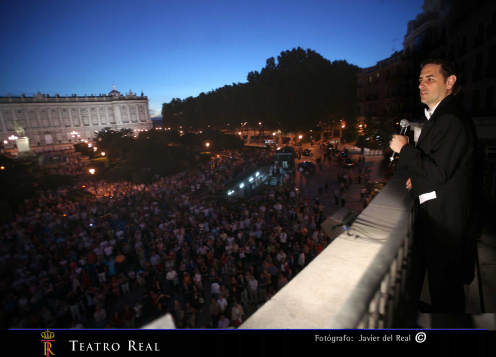Other Links
Editorial Board
-
Editor - Bill Kenny
-
Deputy Editor - Bob Briggs
Founder - Len Mullenger
Google Site Search
SEEN AND HEARD
INTERNATIONAL RECITAL REVIEW
Juan Diego Flórez in
Madrid:
Juan Diego Flórez (tenor)
Vincenzo Scalera (piano Teatro Real de Madrid.2.6.2009 (JMI)
Part I.
Gioachino Rossini
La Cenerentola: “Si, ritrovarla io giuro”
Pechés de vieillesse. La Lontananza and Le Sylvain.
Les Soirées Musicales: L’Orgia.
Zelmira: “Terra amica”
Part II.
Charles Gounod
Romeo et Juliette: “Ah, lève toi soleil”
José Serrano.
La Alegría del Batallón: Guajira.
Agustín Pérez Soriano
El Guitarrico: Serenata (Jota de Perico)
Rafael Calleja/Tomás Barrera
Emigrantes: “Adiós a Granada”
Gioachino Rossini.
Guillaume Tell: “Asile Héréditaire”, “Amis, amis”
Encores:
Gioachino Rossini.
Il Barbiere di Siviglia: “Cessa di Più resistere” (Cabaletta).
Gaetano Donezetti
La Fille du Regiment: “Pour mon âme”
Francesco Paolo Tosti
“L’alba separa dalla luce l’ombra”
María Grever
“Júrame”
Chabuca Granda
“La Flor de la Canela”

There is no doubt that Juan Diego Flórez is one of the very greatest singers nowadays: in his
own repertoire, he is literally incomparable with any other singer. What I have discovered in the last two years
however is that the Peruvian divo has become a singer who shines in a very special way in concerts and
inrecital. For an artist to attain such excellence it is necessary not only to be a great singer, but also to have a very special capacity
for communication with the audience. This capacity demands a natural manner and friendliness
which is getting ever more accentuated. There have been many singers who have been admired by all
their audiences, but it is more than difficult for a singer to be loved as well
as the subject of admiration. This aspect of Juan Diego is most evident with in
his concert and I have rarely witnessed such an evident love affair between
a singer and his public as this time in Madrid.
This recital and the one that will take place next Sunday are a kind of a debt
of gratitude that Juan Diego Florez is paying to the
Teatro Real
public after he cancelled his appearance in Rigoletto there. I am sure that the particular close friendship
between the opera house's Artistic Director Antonio Moral and the Peruvian tenor had much to do with his decision to go ahead with these concerts.
Accompanied at the piano by the equally excellent Vincenzo Scalera, this
recital was not an easy programme for Florez, although he makes everything
seem easy, even the more than difficult. To open the recital with Prince Ramiro's
aria from La Cenerentola was a bold decision, unless like Florez a singer
is fully confident of his abilities. He sang all the Rossini pieces with genuine
taste and musicality ending the first part of the concert with the
“Terra amica” from Zelmira which is full of difficulties, including several high Ds. Judging from what I could
hear, his Zelmira at Pesaro next August is going to be something not to be missed.
I have always thought that Juan Diego Flórez shines particularly
brightly in Rossini, whereas in Donizetti and Bellini he is not at
quite
the same extraordinary level. Even so, in the second part of the recital I was
incredibly impressed with the way he sang the four Spanish pieces, where there
are no stratospheric notes, but just singing
pure and simple. It is surely not possible to sing these songs better than he
did here. No fireworks, just a very sound artist at his best.
In this second part of the program he offered two more pages from opera, one to open an the other to finish. The aria from Gounod’s
Romeo et Juliette was excellent, even though I prefer a different kind of voice for this
music. Finally, the aria “Asile heriditaire” from Guillaume Tell was
simply outstanding, including all the high notes and the following cabaletta “Amis, amis” was excellent
too, but a more heroic voice probably is needed for that one.
The audience was already at Juan Diego’s feet and it was not difficult to understand
why. He had made the gesture of dedicate the whole concert to the memory of Alfredo Kraus,
a singer who his constant model. Offering four very different and difficult encores
would have been complete madness for anyone else singing to a a Teatro
Real audience since everybody knows that he is the best at singing 'Cessa di piú resistere' or the nine high Cs from
La Fille du Régiment, but again he was marvellous, especially in the last two pieces, one by Tosti and “Jurame”, a beautiful bolero.
The audience filled the house and showed their admiration and affection to this great artist
as enthusiastically as anything I can remember. Outside of the Teatro Real thousands of people were following the concert on a giant screen. After the concert, Juan Diego took the microphone from the terrace of the theatre, addressed to the public, and in homage to the many Peruvians there he sang “a capella” La Flor de la Canela.
A true apotheosis an evening to be remembered for years.
Jose M Irurzun
Pictures © Javier del Real
Back to Top
Cumulative Index Page
